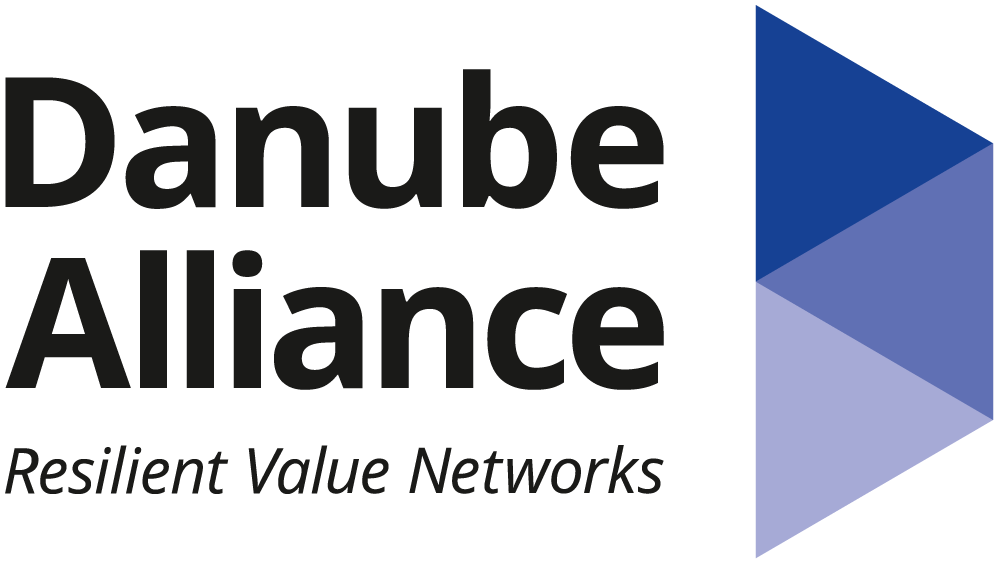Project, 01.01.2020 – 31.12.2022
Submitted by / EUSDR Priority Area(s): PA 8 Competitiveness of Enterprises
The EUSDR focuses in its Priority Area 8 on increasing the competitiveness of SMEs in the Danube Region. As a flagship project of this PA, the “Danube Alliance” aims to contribute to a better resilience of value chains in the Danube Region, especially in order to promote regional competitiveness in sub-regions of the Danube Region in a sustainable way. The main beneficiaries are micro enterprises, SMEs and public administrations. In this way, the project responds to the effects of disruptions and uncertainties in supply chains described above.
Objectives
- Identify potentials to build up resilient value chains in the Danube Region in order to spur sustainable economic development
- Understand specific (bioeconomic) value chains, their characteristics and potentials in terms of sustainable economic development including social and ecological aspects
- Build a methodological framework to analyse and simulate resilient value chain scenarios (including economic, social and ecological factors) as well as business opportunities based on data
- Actively involve stakeholders from the Danube Region (policy makers, regional developers, clusters, SME representatives) to discuss potentials and challenges regarding implementation of value chain use cases
- Disseminate the approaches and support measures provided by the Danube Alliance and raise awareness about value chain resilience and bioeconomy in the political realm
Need and (expected) impact
The Danube Alliance was formed as a response to the Covid-19 pandemic, which revealed the economy’s weak points. Global value chains showed to be vulnerable in extreme situations, not being able to function effectively when the suppliers were compromised due to the pandemic lockdowns as well as geopolitical conflicts or extreme weather events. Because of this, the need to strengthen the resilience in existing macro-regional value chains and develop new green and resilient value chains has significantly increased – especially in the Danube Region where there is a high disparity of living standard, industrial competitiveness and research and innovation. Thus, it is important to raise awareness about the importance of value chain resilience amongst intermediaries and policy makers, and promote new cooperation models and methodologies at regional level to help build up sustainable value chains with economic, social and ecological benefits. Especially the bioeconomy can be understood as key enabler in this regard due to the agricultural structures and great potential in terms of biomass use in large parts of the Danube Region.
Macro-regional dimension
The Danube Alliance addresses the entire Danube Region. While most countries have been involved so far in the form of information events or workshop discussions (e.g. Romania, Austria, Croatia, Serbia, Czech Republic, Slovakia), others are cooperating in the context of developing specific value chain use cases (Vidin region, Bulgaria and Hungary)
Stakeholders involved
Project Partners
- VDI/VDE-IT (lead partner)
- BIOPRO Baden-Württemberg GmbH
- Steinbeis-Europa-Zentrum
- Reutlingen University
Partner Stakeholders from Danube Region
- Several regional developers and cluster managers from many countries in the Danube Region (e.g. Slovenia, Croatia, Serbia, Hungary, Bulgaria, Romania, Slovakia, Austria) have been involved in (online) workshops, information events and other formats (e.g. Danube Festival Ulm 2022)
- Together with ANTEJA ECG from Slovenia, the VDI/VDE-IT conducted a study in the context of the Danube Alliance
- The project consortium will meet and discuss cooperation potentials with Bulgarian policy makers and regional developers in the course of a field trip to Vidin and Sofia in September 2022
- To develop a use case for a Miscanthus value chain in Bulgaria, the project consortium collaborates with an entrepreneur from Baden-Württemberg
- Further actors from research and business level are involved to further develop value chain use cases (e.g. ICP in Slovenia or entrepreneurs from food and packaging sector in Hungary)
Budget and Funding
EUR 222.500 total (EUR 200.000 funded by the state of Baden-Württemberg, EUR 22.500 own funds by project partners)
Further information
https://competitiveness.danube-region.eu/danube-alliance/
A study was conducted together with ANTEJA ECG about the Impacts and Potentials of the Ukraine Crisis on Supply Chain Development for the Danube Region.
Contact

>> Download Certificate <<




